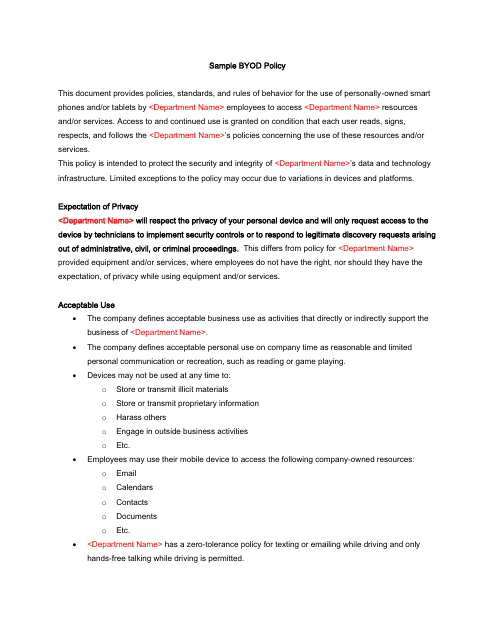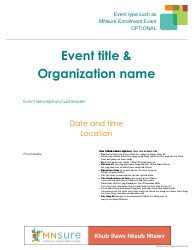Sample Bring-Your-Own-Device (Byod) Policy
A Sample Bring-Your-Own-Device (BYOD) policy is designed to provide guidelines and rules for employees who use their personal devices, such as smartphones and tablets, for work-related purposes. It helps organizations outline acceptable use, security measures, and privacy considerations for employees using their own devices at work.
The Sample Bring-Your-Own-Device (BYOD) Policy can be filed and implemented by any organization or company that allows employees to use their personal devices for work purposes.
FAQ
Q: What is a Bring-Your-Own-Device (BYOD) policy?
A: A BYOD policy is a set of guidelines and rules that a company or organization implements to regulate the use of personal devices, such as smartphones, tablets, and laptops, in the workplace.
Q: Why do companies have BYOD policies?
A: Companies have BYOD policies to allow employees to use their personal devices for work purposes, improving productivity and flexibility. It also helps in cost savings for the company.
Q: What are the benefits of implementing a BYOD policy?
A: Some benefits of a BYOD policy include increased employee satisfaction and productivity, reduced hardware costs for the company, and the ability to attract and retain top talent.
Q: What are the security risks associated with BYOD?
A: Some security risks associated with BYOD include data breaches, malware infections, and loss or theft of devices. These risks can be mitigated through proper security measures and policies.
Q: What should be included in a BYOD policy?
A: A BYOD policy should include guidelines on device registration, data security, acceptable use, employee responsibilities, and consequences for policy violations.
Q: Can an employer require employees to participate in a BYOD program?
A: Participation in a BYOD program is typically voluntary, but employers can make it a condition of employment, subject to legal compliance.
Q: What personal information can employers access in a BYOD program?
A: Employers can generally only access work-related information and systems on an employee's personal device, not personal data or applications.
Q: What should employees do to protect their personal information in a BYOD program?
A: Employees should ensure their personal devices have strong passwords, regularly update software and security patches, and separate personal and work-related data.
Q: Are there any legal considerations for implementing a BYOD policy?
A: Yes, there may be legal considerations such as employee privacy rights, data protection regulations, and compliance with industry-specific laws. It is important to consult with legal professionals when creating a BYOD policy.











